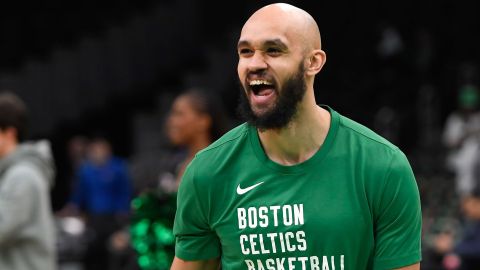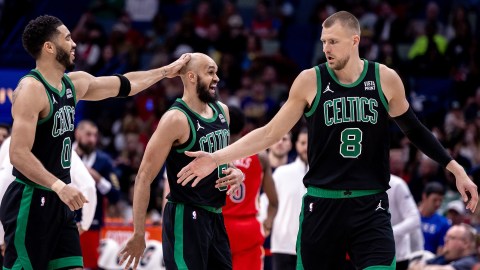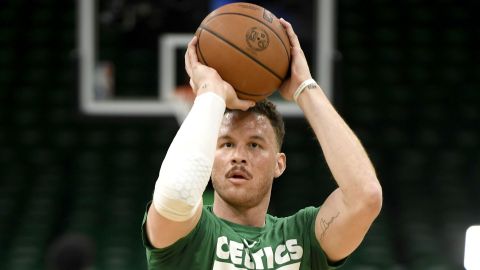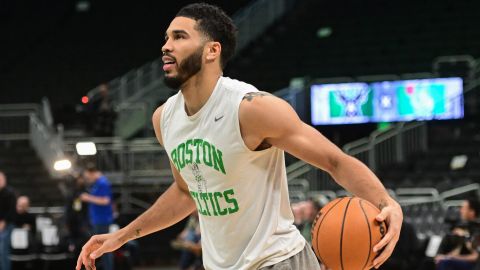 Imagine you are an NBA general manager. You hate Paul Pierce‘s game. You think he is sloppy, inefficient and that he has lost a step. You would never want him on your team, whether that team is up-and-coming, rebuilding or one piece away from title contention.
Imagine you are an NBA general manager. You hate Paul Pierce‘s game. You think he is sloppy, inefficient and that he has lost a step. You would never want him on your team, whether that team is up-and-coming, rebuilding or one piece away from title contention.
You should still put some long, serious thought into trading for Pierce. And it has nothing to do with his abilities as a player.
As the Celtics weigh whether to bring back Pierce next season, the decision has largely been presented as pair of two-choice scenarios. First, the Celtics have to determine whether to bring back the 35-year-old forward or to part ways. Then, the Celtics either will buy out Pierce’s $15.3 million contract for $5 million, or they will trade him to a team in need of one last, expensive, veteran player to put it in the championship conversation. (Many people, with the notable exception of CelticsHub’s Brian Robb, have overlooked the fact that the Celtics could waive Pierce before June 30, however unrealistic and unpractical that may be.)
Near-contenders are not the only teams that could find some use for Pierce, however, thanks to another option that expands the possibilities and should make Pierce an intriguing trade target to just about everyone in the league.
The new collective bargaining agreement kept a lot of the provisions that allowed a traded player to carry virtually all of the rights and stipulations from his contract with the previous team onto his new team. So any team that trades for Pierce also acquires his “Bird rights,” which allow greater flexibility in signing him to an extension, as well as — ready for this? — the right to buy him out for $5 million. Given the CBA’s rules regarding salary-matching on trades, this could be a valuable tool for some team trying to dump some salaries.
Think about it. As a taxpaying team, the Celtics could trade away Pierce’s $15.3 million and get back an amount equal to 125 percent of his outgoing salary, plus $100,000, under the CBA. (They would not be able to actually add the full $19.2 million, based on my math, because that would put them over the $74.3 million luxury tax “apron” at which they are hard-capped as a result of using the mid-level exception on Jason Terry.) The Celtics have 10 players under contract for next season, not counting Pierce or draft picks, which means they can acquire up to five players for roughly Pierce’s $15 million. The team that acquires Pierce, provided it does so before June 30, can turn around and buy him out for $5 million.
Just like that, the other team has rid itself of about 30 percent of the current salary cap for a third of the cost.
Suddenly, the market for Pierce does not look so limited. Even if another team loves Pierce’s game, convincing it to take him for $15.3 million is a hard sell, especially when that team can just wait for the Celtics to buy out or waive Pierce and then sign him to a smaller deal. If they never intend for Pierce to play for them, though, the ability to take on that salary with the express purpose of dumping might be worth the call to Danny Ainge, the Celtics’ president of basketball operations.
As for potential trade partners and what assemblage of talent exists for this deal to make sense for the Celtics, that is a more speculative topic for another story. The financial details of each potential trade change, of course, depending on the other team’s status above or below the cap or the luxury tax line. The pertinent detail is that Pierce’s contract would allow a team that trades for him to eliminate at least $15 million in salary for just $5 million. That is a swap most NBA executives would have to give some thought.
Have a question for Ben Watanabe? Send it to him via Twitter at @BenjeeBallgame or send it here.
*Editor’s note: An earlier version of this story misapplied the rules for how much money the Celtics could take back in a trade as a tax-paying team. The figures have been corrected. Thank you, as usual, to Larry Coon’s NBA CBA FAQ for providing many of the CBA details used in this story.



